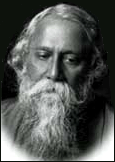| Rabindranath Tagore (1861 - 1941) |
|
Born in Calcutta, into a wealthy family, the son of the Philosopher Maharishi Debendranath Tagore. His name in Bengali is Rabindranath Thakur. Influenced by his cousin Jyoti Parkesh, who showed him how to write poetry with fourteen syllables, he began to write poetry as a child; his first book appeared when he was 17 years old. After a brief stay in England (1878) to study law, he returned to India, where he rapidly became the most important and popular author of the colonial era, writing poetry, short stories, novels, and plays.
|
 |
He composed several hundred popular songs and in 1929 also began painting. A dedicated internationalist and educator, Tagore established a school (1901) in his estate, Shantiniketan, in Bengal, to teach a blend of Eastern and Western philosophies. In 1921 his school was expanded into an international university, Visva-Bharati. He also traveled and lectured throughout the world.
Tagore wrote primarily in Bengali, but translated many of his works into English himself; critics agree they are much more effective in the original. Tagore's writing is highly majestic, deeply religious and imbued with his love of nature and his homeland. He was awarded the 1913 Nobel Prize in literature. His Collected Poems and Plays were published in 1966.
In 1915 he was knighted by the British King George V. Tagore renounced his knighthood in 1919 following the Amritsar massacre of 400 Indian demonstrators by British troops.
Rabindranath firmly believed that education was the only means by which our country could progress. Rabindra babu was the first Indian and an Asian to become a Nobel laureate in Literature. The Queen of England knighted him. Rabindranath Tagore left the earth in 1941.
|
|
| |
| Category filed under: Political |
|
|